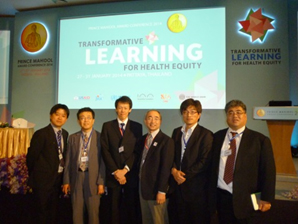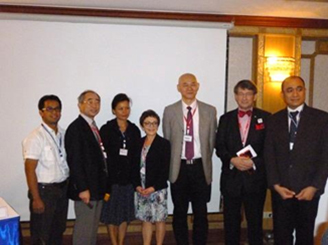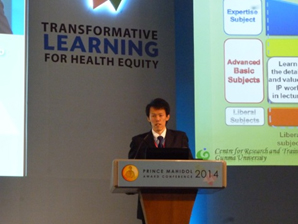Prince Mahidol Award Conference 2014

Prince Mahidol Award Conference 2014
Detail
Term: 27 – 31 January 2014
Venue: The Royal Cliff Grand Hotel, Pattaya, Thailand
Participants from Gunma University
Dr. Hideomi Watanabe, Dean
Dr. Hiromitsu Shinozaki, Professor
Dr. Bumsuk Lee, Associate Professor
Dr. Takatoshi Makino, Assistant Professor
Dr. Hiroki Matsui, Assistant Professor
Participant from Niigata University of Health and Welfare
Dr. Takashi Ito, Professor
Participants from Sapporo Medical University
Dr. Hitoshi Sohma, Professor
Mr. Takeshi Yamamoto, Associate Professor
Introduction:
The Prince Mahidol Award Conference (PMAC) is an annual international conference focusing on policy-related health issues of global significance. The conference is hosted by the Prince Mahidol Award Foundation, the Thai Ministry of Public Health, Mahidol University and other global partners, World Health Organization (WHO), The World Bank, U.S. Agency for International Development (USAID), Japan International Cooperation Agency (JICA), The Rockefeller Foundation, and China Medical Board. It is an international policy forum that Global Health Institutes, both public and private, can co-own and use for advocacy and for seeking international perspectives on important global health issues.
The Second Global Forum on HRH was conducted by PMAC 2011 fostering the global momentum on human resources for health, and Brazil hosted the Third Global Forum on HRH in November 2013. Complementing this broad perspective, the PMAC 2014 focused on health professional and leadership education with its distinctive aspects including enhancing local-global linkages in competencies, team work, the revolution in IT-based learning, and new organizational forms like networking. The theme for PMAC 2014 was “Transformative Learning for Health Equity”. In the program “Synthesis: Summary, conclusion & Recommendations” on the last day Dr. Maeda announced the 543 participants from 62 countries.
Presentation at Parallel Session as speakers:
Prof. Watanabe had a presentation entitled “Interprofessional Education (IPE) in Western Pacific Region” at the Parallel Session 3.5 titled “Implementing Interprofessional Education for Health Equity: Challenges & Solutions”. In the presentation, Prof. Watanabe explained the current situations of IPE initiatives in Western Pacific Region counties and the activities of Japan Interprofessional Working and Education Network (JIPWEN). The JIPWEN advocates and strengthens the IPE activities, and the activities are mostly planed and implemented based on collaboration with WHO through Gunma University as the coordinator university of the JIPWEN and WHO Collaborating Centre. Prof. Watanabe also explained the role of the IPE in the integrated care delivery on the base of the educational effects of IPE at Gunma University, educational institutions being engaged to update pre-service training, and the governmental financial support plays an important role in promoting IPE program in academic settings. Many policy makers and educators expressed their interests in the activities of JIPWEN and Gunma University.
Dr. Makino had a presentation entitled “Interprofessional Education (IPE) -Training and Evidence-” at the Parallel Session 4.2 titled “Quality of Health Professional Education: Do Institutional and Regulation Reforms Matter?”. In the presentation, Dr. Makino explained the introduction of IPE program for undergraduate students and IPE training course for policy makers and educators at Gunma University. Dr. Makino also showed the evidence for the effects of IPE or CP studied on the attitudinal changes in alumni at Gunma University School of Health Sciences. Finally, Dr. Makino confirmed that more evidence for the efficacy of IPE and CP are needed to provide quality services / activities. Many policy makers and educators expressed their interests in the benefits of IPE and they were also interested in the IPE training course in Gunma University.
Prof. Sohma had a presentation entitled “Community Health Care Training to Establish Greater Mutual Understanding between Medical Students and the Community” at the Parallel Session 3.3 titled “Designing for Impact: Achieving a More Integrated Approach to Health Professions Education through Integrating Policies, Training Strategies and Institutional Collaboration”. In the presentation, Prof. Sohma provided a brief overview of the Hokkaido Prefecture in Japan and its similarities to other countries experiencing shortages of health workers / health professionals. The Sapporo Medical University IPE program involves the departments of Medicine, Nursing, Physical Therapy and Occupational Therapy. A key element of the University’s approach has been the evaluation of needs of community with regard to design and development of interprofessional program. Prof. Sohma also discussed results in terms of 1) improving education and service, 2) understanding and establishing effective and appropriate supervisory and service linkages between health professionals, mid-level and community health workers. Many policy makers and educators were interested in the original IPE program which is rooted in the community healthcare.
Collaboration with Education Development Centers in Western Pacific Region to introduce IPE:
In order for Gunma University to perform the Activity of “Collaboration with Education Development Centers in Western Pacific Region introduces IPE, under the coordination of WHO” (ID 17572) of the WHOCC, Dr. Gulin Gedik introduced two Lao PDR EDC staff, Dr. Sing MENORATH and Dr. Phouthone VANGKONEVILAY in the conference. They accepted our visit for IPE Workshop in their country. They proposed the first week in April or the last week in May as candidate dates. After going back to Japan, we will have contact with them in terms of concrete plan of the workshop.











